Venezuelans struggle to survive on the lowest minimum wage in Latin America
Currency devaluation and soaring inflation have crushed monthly incomes to rock-bottom levels
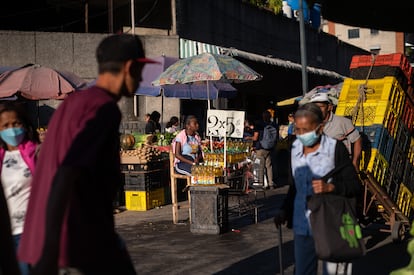

Shopping at the Quinta Crespo open-air market in Caracas vividly illustrates the devastating hardship of ordinary Venezuelans. Beatriz bought her food for the next two days – a $1 head of broccoli. Former security guard Cruz also paid a dollar for a few tomatoes, a spoiled pepper and an onion. Petra, a longtime teacher’s assistant in a preschool, bought a few eggs for $2. These three retired Venezuelans just spent a third of their monthly pension (equivalent to the minimum wage) on a paltry purchase that will only feed them for a few days, if that.
Venezuela’s minimum monthly income is 130 bolivars ($5.40), a pitiful amount that continues to erode due to the nation’s rampant inflation. It is by far the lowest minimum income in Latin America, much below the $100 monthly income in Haiti and Cuba. The United Nations threshold for extreme poverty is $57 per month. This monthly income barely buys a loaf of bread and a liter of milk, four rolls of toilet paper, or 30 pills of generic hypertension medication. It is not enough to pay for a home’s electricity, water and telephone services.
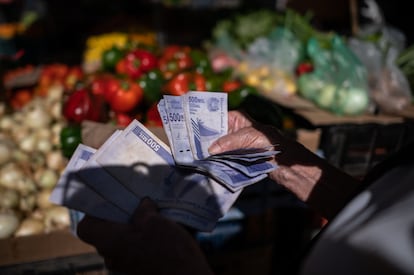
In the first two months of 2023, more than 1,000 protests erupted throughout Venezuela, demanding a minimum wage increase that would also inflate public payrolls at every level. Teachers, university professors, health care and factory workers have led daily demonstrations while President Nicolás Maduro dithers. In early March, university instructors declared a 48-hour strike. “We will come up with the resources,” said Maduro a few days ago after again blaming the country’s ills on economic sanctions by the United States. The last minimum wage increase was one year ago.
During a teacher demonstration in early March, labor union leaders demanded that the government release resources earned by the Orinoco Mining Arc National Strategic Development Zone, an area rich in mineral resources that Maduro hopes will make up for declining oil revenues. The teachers’ union wants salary increases, payment of wages due since 2018 and restoration of other workers’ rights. The teachers asked inspectors from the Ministry of Labor to intervene in the ongoing dispute that has spurred repeated protest marches and reduced school days aimed at pressuring the government.
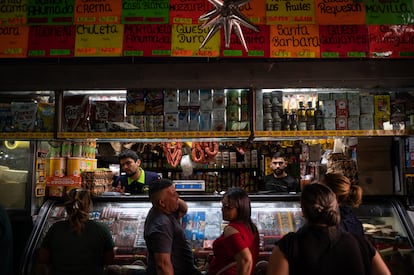
Fewer than 100 educators showed up for the demonstration, but it was still heavily surveilled by police and government intelligence units. Jorge Guerra, a mathematics and physics teacher, was among the protestors. He earns the equivalent of four monthly minimum wages ($20) and spends it all on transportation to work. Like many other teachers, Jorge takes other jobs to get by. “I worked at the docks loading cargo for one day and earned the same as my monthly teacher’s salary. I have also worked as a painter’s assistant and earned much more,” he said. “I’ve thought about abandoning teaching to do that kind of work full-time.” Guerra’s wife works in the private sector and gets bonuses in dollars that pay the rent.
When we met Guerra, he was carrying a backpack with supplies provided by the Local Committees for Supply and Production (CLAP), a government-subsidized food distribution program. Many local committees use the CLAP supplies to operate corrupt barter schemes. Guerra opened his backpack and showed us several bags of flour and two cans – sardines and ham – the only protein included in his monthly allotment.
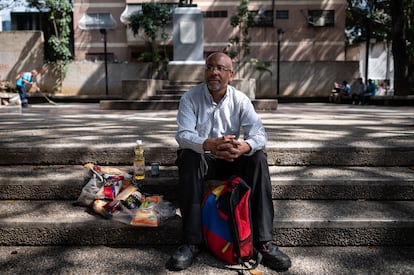
Noris is a civil servant in the Ministry of Labor who, after almost 25 years of service, earns a little more than the minimum wage. She supports her two younger children with the help of her eldest son and stretches the chicken and beef they can eat twice a month with squash and other vegetables. She hasn’t bought any new clothes in years. During the pre-Lenten Carnival celebration, the government doled out a so-called “war bonus” of 88 bolivars ($3.50) which she used to buy a piece of cheese. “This is terrible. Our money doesn’t go very far, and I don’t see things getting better,” said Noris.
According to official data, there are 5.5 million public sector workers in Venezuela, plus another five million pensioners, all of whom receive minimum wages or pension incomes that fall far short of the amount needed to cover the $400 basic family food basket for one month. “In Venezuela, you can have eight or ten jobs each paying the minimum wage and still live in poverty,” says economist José Manuel Puente, a professor of the Institute of Advanced Higher Studies in Venezuela who also teaches at the International University and the University of Salamanca in Spain.
“The root causes are the currency devaluation and inflation that have devastated Venezuelan wages. January’s inflation rate was 39%, and the annualized inflation rate was 440%, destroying purchasing power. Inflation is close to 50% per month, which is a sign that hyperinflation could return after the nation experienced the second longest period of hyperinflation in its history,” says Puente.
Labor discontent in Venezuela has caught the International Labor Organization’s (ILO) attention. A few weeks ago, an ILO technical committee was established to discuss methods for addressing the minimum wage issue with various labor organizations. President Maduro raised the minimum wage a year ago from $2 to $30 a month, an enormous increase in nominal terms that was erased within a year when the bolivar dropped to one-fifth of its former value against the US dollar. The minimum wage is so low that it has long ceased to be a benchmark for the private sector, which on average pays $126 per month to lower-level workers.
Data is needed to find ways of solving the minimum wage problem, but the government has not published information on public finances for more than a decade. The national budget is not published and revenues and expenditures are unknown. “The government uses the minimum wage to keep costs down, but we don’t understand why since there’s no reason for it,” says Hermes Pérez, an economist and former Central Bank of Venezuela official.
Pérez notes that despite the lack of government transparency, OPEC reports indicate that the government earned oil revenues of $18 billion in 2022, three times more than the $6 billion it earned in 2020. The increased oil revenue comes from higher crude oil prices caused by Russia’s war in Ukraine. “The government has the money to pay higher salaries,” says Pérez. In 2022, Maduro imposed a tax on dollar transactions that enabled the government to rake in $4.7 billion, an 86% increase over the previous year.
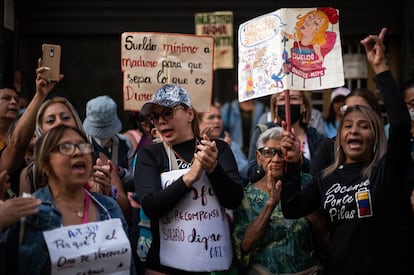
Minimum wage increases have been resisted for years since they tend to drive up prices. But even the business sector, represented by the Fedecámaras association, has joined labor unions in their demand for a higher minimum wage that will lead to greater purchasing power and stimulate growth. “The economy is 30% of what it was a decade ago. It’s tiny and shrinking because no fiscal and monetary policy coordination exists. The only way for wages to gain purchasing power is with increases in production and productivity,” says Puente.
Ecoanalítica, an economic analysis firm, recorded a drop of more than 23% in sales volume in Caracas since December. This indicator dramatically illustrates the slowdown of the Venezuelan economy and has exacerbated price increases, which lead to louder demands for higher wages. The year started poorly, starkly contrasting with early 2022, when the Venezuelan economy seemed on the right track. Andrés Bello Catholic University in Caracas recently published a survey on the psychosocial situation in the country, which found that 60% of Venezuelans say their primary source of stress is economic problems.
Life is even harder in the country’s interior. Miguel moved to the capital from the eastern town of Güiria four months ago. He became a farmer four years ago after retiring from the armed forces, where he earned the minimum wage. “You work, but you just can’t make ends meet. There’s no hope for any kind of future here,” he says. Now he sits in the sun on a Caracas sidewalk, selling produce in the Quinta Crespo market to make enough to live in the capital and send money home to his wife and two daughters in Güiria.
Sign up for our weekly newsletter to get more English-language news coverage from EL PAÍS USA Edition
Tu suscripción se está usando en otro dispositivo
¿Quieres añadir otro usuario a tu suscripción?
Si continúas leyendo en este dispositivo, no se podrá leer en el otro.
FlechaTu suscripción se está usando en otro dispositivo y solo puedes acceder a EL PAÍS desde un dispositivo a la vez.
Si quieres compartir tu cuenta, cambia tu suscripción a la modalidad Premium, así podrás añadir otro usuario. Cada uno accederá con su propia cuenta de email, lo que os permitirá personalizar vuestra experiencia en EL PAÍS.
¿Tienes una suscripción de empresa? Accede aquí para contratar más cuentas.
En el caso de no saber quién está usando tu cuenta, te recomendamos cambiar tu contraseña aquí.
Si decides continuar compartiendo tu cuenta, este mensaje se mostrará en tu dispositivo y en el de la otra persona que está usando tu cuenta de forma indefinida, afectando a tu experiencia de lectura. Puedes consultar aquí los términos y condiciones de la suscripción digital.








































